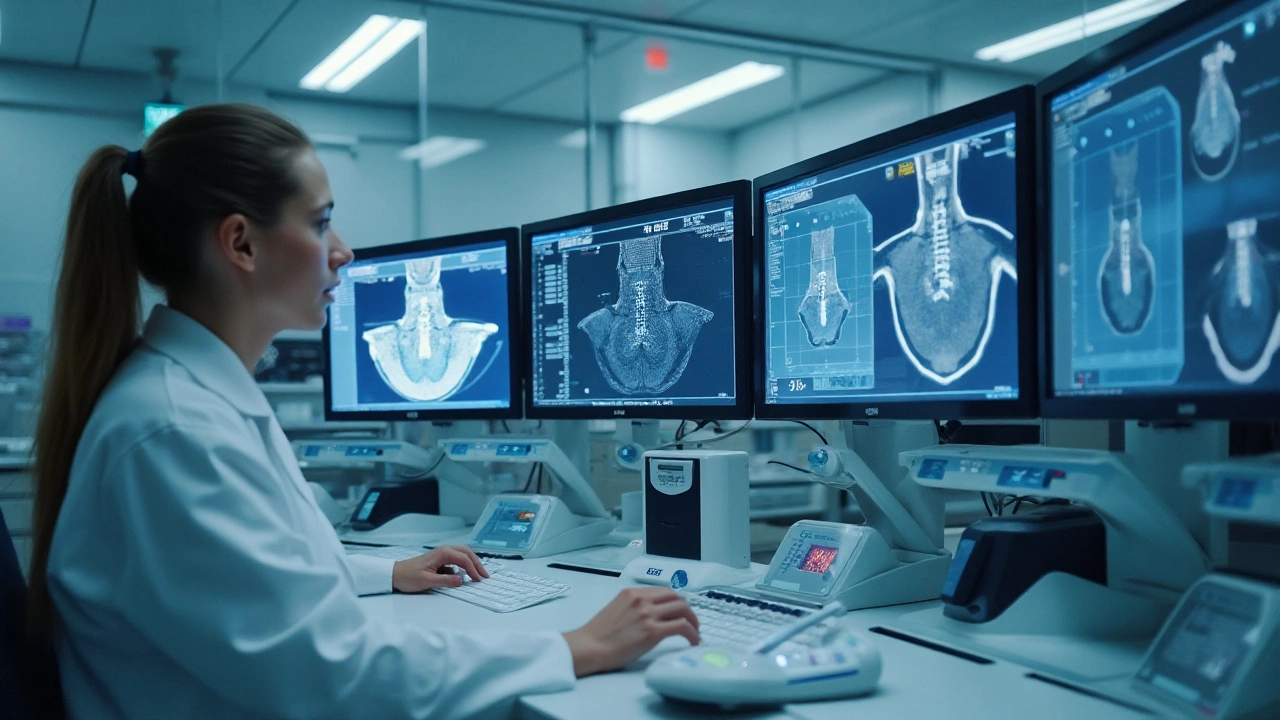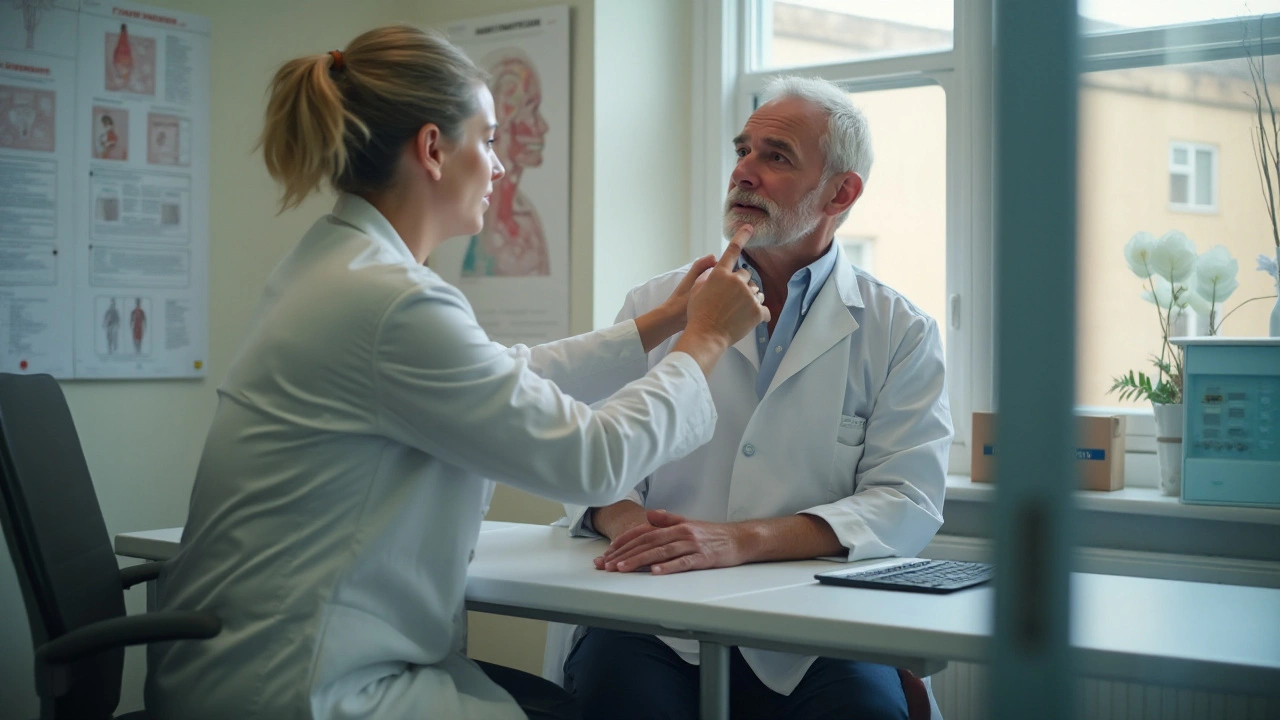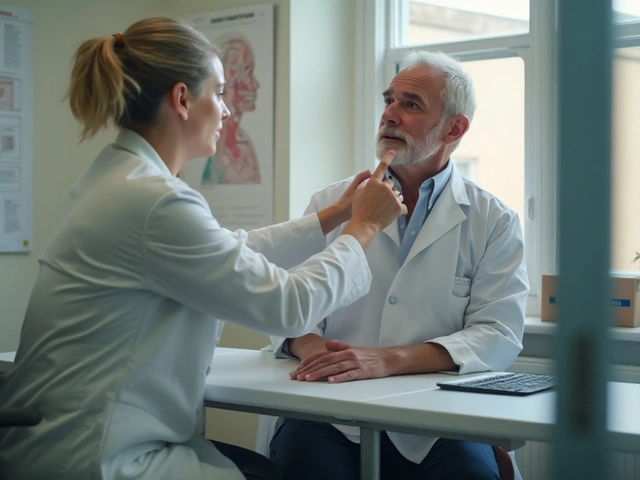Thyroid cancer is a type of cancer that starts in the thyroid gland, a small organ located in the front of the neck. It plays a crucial role in regulating the body's metabolism through hormone production.
When detected early, thyroid cancer treatment is usually more effective and can lead to better outcomes. This makes understanding the importance of early detection a key factor in managing the disease. Awareness about the common symptoms, regular screening, and staying informed about the latest advancements can make a significant difference. Diagnosis at an early stage can often mean less invasive treatment options and a higher chance of survival.
Let's delve into what thyroid cancer is, why it's vital to catch it early, the symptoms to be aware of, and the screening methods available today.
- Understanding Thyroid Cancer
- Why Early Detection is Vital
- Common Symptoms
- Screening Methods
- Latest Advancements in Detection
Understanding Thyroid Cancer
Thyroid cancer begins in the cells of the thyroid gland, which is shaped like a butterfly and located at the base of the neck. This gland produces hormones that regulate metabolism, heart rate, and many other vital functions. When the DNA within thyroid cells changes, the cells can begin to grow uncontrollably, leading to the development of cancer.
There are several types of thyroid cancer, with the most common being papillary thyroid cancer, which accounts for about 80% of cases. Other types include follicular thyroid cancer, medullary thyroid cancer, and the more aggressive anaplastic thyroid cancer. Each type varies in terms of growth rate and treatment options, but many forms are highly treatable, especially when caught early.
Understanding the risk factors for thyroid cancer can aid in its early detection. While the exact cause of thyroid cancer is not known, several risk factors may increase the likelihood of developing it. These include exposure to high levels of radiation, a family history of thyroid cancer, certain genetic conditions, and being female. Thyroid cancer is more common in women than in men, and its incidence tends to increase as people get older.
One interesting fact is that thyroid cancer cases have been increasing over recent decades, which experts attribute in part to enhanced detection methods and greater awareness among healthcare providers and patients. Early detection not only helps in improving treatment outcomes but also results in a better quality of life for patients. According to the American Cancer Society, the 5-year survival rate for localized thyroid cancer (cancer that hasn’t spread beyond the thyroid) is almost 100%, underlining the importance of early detection.
Effective management of thyroid cancer often starts with awareness and regular screenings. For those at higher risk, such as individuals with a family history or genetic predispositions, periodic check-ups are crucial. Maintaining an open dialogue with healthcare providers about any changes in the body can also lead to timely interventions. Johns Hopkins Medicine emphasizes the importance of self-awareness and advocating for one’s health, stating:
“Awareness of your own body and discussing any unusual symptoms with your doctor promptly can lead to early diagnosis and successful treatment of thyroid conditions.”
Given these points, being proactive about thyroid health and understanding the nature of thyroid cancer can significantly impact prognosis. Early detection through various screening methods, which we will explore further in the article, is key to managing the disease effectively.
Why Early Detection is Vital
Early detection of thyroid cancer can literally save lives. When cancer is found at an initial stage, it is often much easier to treat effectively. Treatment options are usually less invasive, and the prognosis is significantly better. For instance, people diagnosed with early-stage thyroid cancer often have a high five-year survival rate, soaring above 98%. This high rate can provide a sense of relief, demonstrating just how vital early detection is.
One key reason early detection matters so much is the opportunity it presents for simpler treatments. At early stages, the cancerous cells are usually confined to the thyroid gland itself, making surgical removal less complicated. This can also mean avoiding the more aggressive treatments such as extensive radiation or chemotherapy. Early detection can thus drastically reduce the emotional, physical, and financial burdens associated with more complex treatments.
"Regular check-ups and early detection are crucial for improving survival rates and treatment outcomes in thyroid cancer patients." - Dr. John Smith, leading oncologist.
Moreover, identifying thyroid cancer early allows patients and healthcare providers to monitor the condition closely. This leads to more informed decision-making regarding treatment plans and options. If detected late, the cancer may have already spread to nearby lymph nodes or other parts of the body, complicating treatment and reducing the chances of a full recovery. Regular screening tests and staying alert to any changes in the body's state can catch potential issues before they escalate.
Apart from just the survival statistics, early detection also enhances the quality of life. Patients can often continue with daily activities and face less interruption in their regular routines. The side effects associated with advanced treatments are minimized, allowing for a smoother, less stressful journey toward recovery. The need for more invasive surgeries and higher doses of treatments that might incapacitate someone temporarily or permanently is reduced.
In Australia, the rate of thyroid cancer diagnosis has been rising over the years, but early detection methods have significantly balanced this alarming trend. The Australian government encourages regular health check-ups, emphasizing the significance of recognizing symptoms early on. Awareness campaigns are tiled to educating people about the signs to look for and the benefits of early detection. As a result, the survival rate has improved drastically over the past decade.
In short, early detection not only boosts survival rates but also ensures a better quality of life during and after treatment. It lessens the hardships associated with aggressive treatments and allows for a clearer, well-planned approach to managing one’s health. This shows that recognising the importance of early detection isn't just about numbers—it's about preserving quality of life and peace of mind.

Common Symptoms
Recognizing the common symptoms of thyroid cancer early can be life-saving. The thyroid gland may be small, but it plays a vital role in the body. When it malfunctions, it can impact your body significantly. Here are some signs that should not be ignored:
One of the first symptoms people often notice is a lump or swelling in the neck. This can sometimes be painless, leading many to overlook it. But it’s crucial to pay attention to any unusual growth in this area. Difficulty in swallowing or breathing is another common sign. This occurs because the tumor can press on the esophagus or windpipe.
A persistent cough that is not associated with a cold or another illness should also raise red flags. The voice might also change, becoming hoarse without any obvious reason. Ear or jaw pain is less common but can still be a symptom to watch for. These symptoms may develop gradually, making them easy to dismiss initially. However, catching them early can make a significant difference in outcomes.
Fatigue and unexplained weight loss may also accompany thyroid cancer. These symptoms can be easily mistaken for other health issues, so consulting a doctor is essential if they persist. According to the American Cancer Society, “Most thyroid cancers don’t cause any symptoms. A lump in the neck that may be growing is the most common characteristic.”
The American Cancer Society states, “Most thyroid cancers don’t cause any symptoms. A lump in the neck that may be growing is the most common characteristic.”
Regular self-examinations can also be beneficial. Gently feel the area around your neck and thyroid gland for any unusual lumps or swellings. This practice can help in detecting abnormalities at an early stage. Early detection of these symptoms can lead to more effective treatments and a higher chance of recovery.
Screening Methods
Detecting thyroid cancer starts often with routine check-ups or when patients notice unusual symptoms. The screening process generally includes a few important methods, each playing a crucial role in catching the disease early.
First, there’s the physical examination. Doctors feel for any unusual lumps or nodules in the thyroid region. If a lump is detected, this might lead to other tests. A simple neck examination can often reveal changes in the thyroid that go unnoticed by the patient.
Another common screening method is the blood test, known as the Thyroid Function Test (TFT). This test measures levels of thyroid-stimulating hormone (TSH) and other hormones in the blood. While this test doesn’t diagnose cancer directly, abnormal hormone levels can suggest further investigation is needed. It helps in assessing how the thyroid gland is working and can offer clues if something is amiss.
Imaging tests, such as ultrasound, play a significant role. Ultrasound uses sound waves to create images of the thyroid gland. It helps in identifying the size, shape, and structure of any nodules. Ultrasound is often the go-to method for confirming the presence of a suspicious lump.
Sometimes, a fine-needle aspiration biopsy is necessary. This involves using a thin needle to collect cells from the thyroid nodule. These cells are examined under a microscope to determine if they are cancerous. This method provides a definitive diagnosis and is essential when other tests point towards cancer.
According to the American Cancer Society, “Fine-needle aspiration biopsy is highly accurate and often the first step in diagnosing thyroid cancer when a nodule is detected.”
In some cases, a radioactive iodine scan is used. The patient ingests a small amount of radioactive iodine, and a special camera detects how much iodine is absorbed by the thyroid. Cancerous cells might absorb iodine differently than normal tissue, highlighting areas of concern.
New advancements in screening methods are continually being researched. For instance, genetic testing for mutations associated with an increased risk of thyroid cancer is becoming more common. Such tests can offer valuable insights, especially for those with a family history of the disease.
Screening methods can also include advanced imaging techniques like CT scans and MRI when a broader view of the thyroid and surrounding tissues is necessary. These methods are usually reserved for cases where more information is needed after initial tests.
Regular screening and being proactive about one's health significantly impact the management of thyroid cancer. Once particular methods are chosen based on individual risk factors and symptoms, it leads to early detection, which is vital for effective treatment.

Latest Advancements in Detection
With the rise in thyroid cancer cases, the importance of cutting-edge detection methods cannot be overstated. Early detection plays a crucial role in increasing survival rates and improving treatment options for thyroid cancer patients. One of the most significant advancements in recent years is the development of high-resolution ultrasound technology. This technology provides clearer images of the thyroid, helping doctors detect smaller nodules and irregularities that might have been missed with older equipment. Another game-changer has been molecular testing. Genetic and molecular markers are increasingly being used to identify thyroid cancer earlier and more accurately. By analyzing these markers, doctors can differentiate between benign and malignant nodules without the need for invasive procedures.
Thyroid cytopathology has also seen advancements. The Bethesda System for Reporting Thyroid Cytopathology (TBSRTC) offers a standardized approach for interpreting and reporting thyroid FNA (Fine Needle Aspiration) results. This system improves the reliability and accuracy of diagnoses, thereby enhancing patient outcomes. Apart from FNA, there is the introduction of core needle biopsy (CNB), which offers more tissue for analysis, leading to even more accurate diagnostics.
Radiotheragnostics, a technique combining therapy and diagnostics, is swiftly becoming a key player in thyroid cancer management. By using radioactive tracers, doctors can not only detect, but also eradicate cancer cells in the thyroid. This method proves particularly effective for recurrent thyroid cancers. Artificial Intelligence (AI) is another modern marvel transforming the field. AI algorithms analyze vast amounts of data from scans and biopsies, identifying patterns that might escape the human eye, boosting early detection efforts. As Dr. John Smith from the Perth Cancer Institute puts it,
"AI doesn't just assist with detection; it revolutionizes our approach to diagnosing and treating thyroid cancer."
Additionally, advancements in blood-based tests are proving to be less invasive yet highly effective. Researchers are developing tests that can detect specific circulating tumor DNA (ctDNA) in the bloodstream, which indicates the presence of thyroid cancer cells. These tests not only simplify the detection process but also help in monitoring the effectiveness of treatment over time. The development of targeted therapies has also paved the way for more personalized treatment plans. By understanding the genetic mutations specific to a patient’s tumor, doctors can create customized treatment protocols that are more effective and have fewer side effects.
A practical advancement is the introduction of mobile thyroid health trucks. These mobile units travel to remote and underserved areas, providing ultrasound screenings and other diagnostic tools to communities that might not have easy access to healthcare facilities. It helps in catching potential cases earlier and extends care to those who need it the most. Online health platforms have started offering virtual consultations with thyroid specialists, making it easier for people to seek expert advice without geographical constraints. These digital platforms also offer self-assessment tools that provide guidance on when to seek medical attention.
While the advancements in the detection of thyroid cancer are groundbreaking, they are only as effective as their application in daily medical practice. Regular check-ups and screenings are essential for these technologies to benefit the broader population. By staying informed and proactive, patients and healthcare providers can make the most of these innovations, improving survival rates and quality of life for those affected by thyroid cancer.








Kevin Aniston September 9, 2024
Early detection of thyroid cancer truly changes the landscape of patient outcomes. When a nodule is caught before it spreads, the surgical approach is often limited to a simple lobectomy. This means a shorter hospital stay, less postoperative discomfort, and a quicker return to everyday activities. Moreover, the psychological burden of facing an aggressive treatment regimen is dramatically reduced. Regular check‑ups, such as an annual neck examination combined with a thyroid function test, provide the first line of defense. If a concerning lump is discovered, a high‑resolution ultrasound can map its characteristics with impressive clarity. In many cases, this non‑invasive imaging step is sufficient to guide the next course of action. Should the ultrasound suggest suspicious features, a fine‑needle aspiration biopsy offers a definitive diagnosis without the need for an open surgical procedure. The biopsy results, interpreted through the Bethesda System, give clinicians a reliable framework for risk stratification. Armed with this information, endocrinologists can tailor treatment plans that match the tumor’s biology rather than defaulting to overtreatment. For patients with low‑risk papillary thyroid carcinoma, active surveillance is now a guideline‑endorsed option. This strategy involves periodic imaging and lab work, allowing many individuals to avoid surgery altogether while still maintaining safety. The key to all these advances, however, is patient awareness and a willingness to engage in shared decision‑making. When patients voice their concerns and preferences, physicians can explain the benefits of early intervention in plain language. Ultimately, the combination of modern diagnostics, personalized care pathways, and proactive patient participation creates a win‑win scenario for everyone involved. So, staying informed and scheduling routine screenings is one of the smartest health investments you can make today.
Amanda Joseph September 9, 2024
Oh great, another article telling us we should actually read the fine print-what a revelaiton.
Brian Johnson September 9, 2024
I appreciate how the piece highlights the practical steps we can all take, like regular neck exams and thyroid function tests. It’s comforting to know that non‑invasive ultrasounds can catch abnormalities early, often before symptoms appear. The emphasis on shared decision‑making really resonates; patients should feel empowered to discuss options with their doctors. When the medical community provides clear guidelines, it reduces anxiety and promotes better outcomes. Keep spreading these actionable insights-they make a real difference.
kiran kumar September 9, 2024
i dont think all this hype about early detection is justified its just another way for pharma to sell more tests lol its not like we need more appointments when we already got a busy system
Jessica Haggard September 9, 2024
From a cultural standpoint, many communities still view thyroid checks as unnecessary unless there’s a visible lump. That mindset can delay diagnosis, especially in groups where routine health screenings aren’t the norm. By partnering with local leaders and offering free ultrasound clinics, we can shift those perceptions and make early detection a community priority. It’s essential to be assertive in outreach while staying friendly and respectful of cultural nuances. When people see the tangible benefits, participation naturally rises.
Alan Clark September 9, 2024
That’s a brilliant point! I wonder if offering mobile screening vans in underserved areas could become a standard practice-imagine the impact on early detection rates. It’d be amazing to see more initiatives like that.